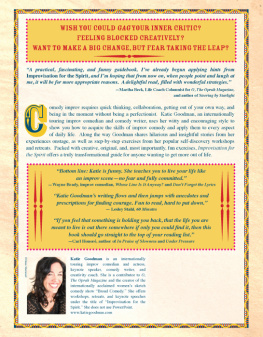Copyright 2017 by KiCam Projects
All rights reserved. No part of this publication may be reproduced, stored in a retrieval system, or transmitted, in any form or by any means,
electronic, mechanical, photocopying, recording, or otherwise,
without the prior written permission of the publisher.
Cover and book design by Mark Sullivan
Author photo: Robert Preidt
ISBN 978-0-9977222-1-5
Published by KiCam Projects
www.KiCamProjects.com
Printed in the United States of America.
Printed on acid-free paper.
contents
preface | vii
introduction | xi
chapter one | A Spiritual Approach |
chapter two | Open Your Mind |
chapter three | The Role of Creativity |
chapter four | Gratitude |
chapter five | Keeping a Journal |
chapter six | Taking Charge |
chapter seven | The Balancing Act |
chapter eight | A Support Team |
chapter nine | Daily Structure |
chapter ten | Keeping It Positive |
chapter e leven | Recovery as a Lifestyle |
conclusion |
acknowledgments |
appendix |
resources |
bibliography |
For Robert, who stood quietly by my side from the start and supported me through life-changing decisions. Thank you for saying the things that need saying, even when difficult for me to hear. Thank you for being my writing coach, photographer, and friendly first editorI trust you completely. You are the best!
preface
I have always been fascinated by seeing buildings imploded, especially those tall ones coming down on a busy city street like we sometimes see on the news. Its impressive. How deafening the sound must be. My imagination is captured by the wonder of the scene, by the expert engineering and intricate planning needed to accomplish such a project while ensuring that the streetscape surrounding the building remains intact as if the neighboring structures had no idea what just happened.
Forcing a skyscraper to crumble at one persons command takes months of sophisticated planning and preparation from a variety of experts, all for something that lasts only a few seconds. And knowing that no two implosions can ever be executed in exactly the same way fascinates me. Theres something pure about it, to decimate a giant structure with the least amount of external disruption.
Now, imagine if your brain experienced such an implosion. Not as a result of a well-orchestrated plan but from having abdicated its responsibility for managing the chemistry in your synapses, the ones that control your thoughts and behaviors. In what might seem like a few seconds, the mind just checks out. Poof! I am outta here! Its not that your mind is otherwise occupied by a daydream or is busy with meditation. It is simply vacant, not on call anymore. Why would your mind want to do this?
In my case, my mind checked out in an attempt at self-preservation. It no longer could cope with the demands of life and the expectations I had placed on myself. At a subconscious level, it was all too much. Rather than my brain cracking in a visible and public way, like my femur might do if subjected to severe impact, my mind chose to silently implode. It was January 21, 2002, the day my son turned eighteen. It was a day I will never forget.
I experienced what is currently called Major Depressive Disorder; it used to be called severe or clinical depression. Decades ago, they would have labeled it a nervous breakdown. Interestingly, I feel a stronger resonance for this later term, as it very closely describes my own experience: My mind was certainly broken, barely functioning at all. The thinking part was only a hair above a vegetative state; and my nervous system was definitely out of whack.
It took a full year of very gradual healing before I could return to work and start relearning how to complete simple office tasksbeginning with data entry, progressing to preparing standard letters where only the employees name and address changed, to eventually using my writing skills to edit correspondence, and finally advancing to talking to colleagues on the phone to verify information contained in the lettersthis work-hardening took place over a period of six months.
I was to revisit the state of depression several times over nine years, although those events were never as severe as the initial breakdown. Its gloomy specter hanging over me was enough to move me to get the necessary treatment at even the slightest sign of mental distress. That is the real tricklearning to recognize the earliest signals of potential overload or anxiety in time to thwart its progress and prevent full-on depression.
I became my own expert at this early-detection workat identifying my personal canary in the coalmine, so to speak. I became a person who values mental health above everything else in life. Because if I dont have a healthy mind, the world holds no interest for me.
Depression is an insidious disease, lurking in the mind in places hidden from everyone, including yourself. But it can no longer hide from me. I have mastered its detection and I am back in charge.
I have learned that so long as I give my spirit what it wants and needs, as something that is essential to my whole person, I will continue to succeed at keeping a healthy balance in my life, far away from depression.
For years I struggled with this debilitating disease, a disease that is too scary for most people to talk about. I worked very hard at getting well and staying well. And I long to contribute my experience and hands-on knowledge if it can help another broken soul put a life back together. I long for my experience to be put to a larger use and purpose.
What if I could? What if someone who is struggling right now, who is desperately trying to hang on to some sense of normality, to a reality that she used to know, were to pick up this book? What if something about the words on these pages led one person to seek treatment, or led her to a resource that made a difference? Wouldnt that be worth doing? Oh, yes, it certainly would.
I am committed to contributing in some small way to positive change. I enjoy serving the higher good through the joy of expanding my abilities and talents. And I trust that my truth as explained in this book will be just the right thing for someone out there. Whoever you are, bless you!
introduction
I t was the pacing. Back and forth, back and forth in front of my desk. I had just returned from my lunch break, alone, again. Even though Id been working there for eleven years, I didnt have workplace friendsdidnt know anyone well enough to go out to lunch with, to talk to about my work frustrations, the sense that I had bitten off more than I could chew when I accepted this new role. It had been four months and I still had not gotten to the bottom of all that it entailed; I felt that I was forever catching up, that I should be working on a different burning issue, one that I wasnt even aware of yet. I was given boxes of files that were now my responsibility and I still hadnt gotten through them all. I felt as though at any moment something in that box would explode in my face.
I was beginning to understand that this was a bigger job than I expected and I couldnt see my way through it. I felt trapped, with no one to call on for help. My manager was a high-level executive with much bigger fish to fry than my feelings of incompetence. I had convinced her during the interview that I was the best person for the job, so I wasnt about to let her know that she had made a mistake in hiring me.
In my world, a professional employee can handle things; she keeps trouble out of her bosss hands by anticipating and dealing with it first. I had been super competent in my previous jobs; this was my self-image and that of my colleagues and management.
As I returned to my desk, I couldnt seem to focus as I tried to remember where I had left off. I sat at my computer in a daze, not knowing where to start or what to do. Was it the pile of letters that I should work on or e-mails? I couldnt make heads or tails of my desk, which was just a bunch of files and stacks of papers. My head was a blur. Get a grip; just remember what you were doing before going for lunch, I thought. But that was the problem. Every pile of work looked urgent. If I do this one, then I won t have time to get to that one. I felt a glassy-eyed paralysis come over me, a deer-in-the-headlights, brain-numbing sensation. I had been staring at my computer for the better part of an hour and I was no further ahead.
Next page







